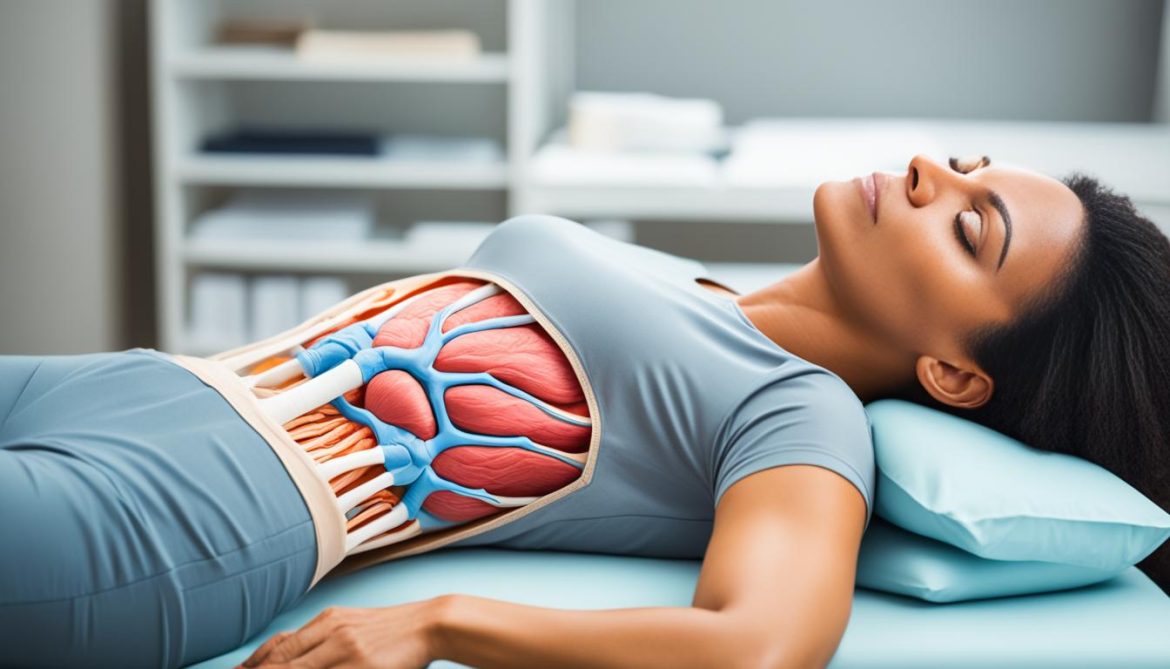Painful intercourse, also known as dyspareunia, can be a distressing experience that many women may encounter at some point in their lives. If you are experiencing painful penetration, it is important to understand the potential causes and seek appropriate medical attention. By addressing the underlying factors, you can find relief and regain the pleasure and intimacy in your sexual experiences.
There are several reasons why penetration may cause discomfort or pain. Understanding the potential causes can help you navigate the issue and seek the right treatment.
Key Takeaways:
- Lack of lubrication, certain medications, injury or trauma, inflammation or infection, and emotional factors can contribute to painful intercourse.
- Physical causes of pain during sex can include inadequate lubrication, injury or irritation to the genital area, and conditions like vaginismus or anatomical abnormalities.
- Deep pain during penetration may be caused by conditions such as endometriosis, pelvic inflammatory disease, uterine prolapse, or fibroids.
- Emotional factors like anxiety, depression, and relationship problems can impact arousal level and contribute to pain during sex.
- Consulting with a healthcare provider can help pinpoint the cause of painful intercourse and explore appropriate treatment options.
Physical Causes of Painful Intercourse
When it comes to pain during sexual intercourse, the causes can vary depending on whether the pain occurs at entry or with deep thrusting. Understanding the physical causes of vaginal discomfort during sex is crucial in identifying and addressing the underlying reasons for pain during intercourse.
Inadequate lubrication is a common physical cause of pain during penetration. Factors such as insufficient foreplay, hormonal changes after menopause or childbirth, or certain medications can contribute to a lack of lubrication, resulting in discomfort during sex.
Injury, trauma, or irritation to the genitals can also lead to pain during sexual intercourse. Whether it’s due to rough intercourse, accidents, or medical procedures, any damage to the delicate tissues in the genital area can cause discomfort during penetration.
Inflammation, infection, or skin disorders in the genital area can also contribute to painful intercourse. Conditions such as yeast infections, urinary tract infections, or dermatological conditions like eczema or psoriasis can cause irritation and pain during sex.
Furthermore, certain conditions can cause chronic pain during intercourse. Vaginismus, for example, is a condition characterized by involuntary muscle spasms in the vaginal wall, making penetration painful or even impossible. Anatomical abnormalities, such as vaginal agenesis (absence of a fully-formed vagina) or imperforate hymen (a hymen that completely obstructs the vaginal opening), can also lead to dyspareunia.
Possible Physical Causes of Painful Intercourse:
| Physical Cause | Description |
|---|---|
| Inadequate Lubrication | Insufficient natural lubrication during sexual activity due to factors like lack of arousal, hormonal changes, or certain medications. |
| Injury, Trauma, or Irritation | Genital injuries, trauma from accidents or medical procedures, or irritation caused by rough intercourse or external factors like chemicals. |
| Inflammation, Infection, or Skin Disorders | Conditions such as yeast infections, urinary tract infections, or dermatological disorders affecting the genital area. |
| Vaginismus | Involuntary muscle spasms in the vaginal wall, leading to pain or difficulty with penetration. |
| Anatomical Abnormalities | Structural irregularities like vaginal agenesis or an imperforate hymen, affecting the ability to have pain-free intercourse. |
Addressing the physical causes of painful intercourse requires proper diagnosis and a comprehensive treatment approach. Consulting with a healthcare provider can help in identifying the underlying reasons for pain during sex and finding appropriate solutions to improve your sexual well-being.
Deep Pain During Penetration
Deep pain during penetration can be a distressing experience, particularly during deep thrusting or specific positions. This type of discomfort can be caused by various underlying conditions or medical treatments. It’s essential to pinpoint the cause of the pain in order to explore appropriate treatment options.
Conditions such as endometriosis, pelvic inflammatory disease, uterine prolapse, fibroids, irritable bowel syndrome, and ovarian cysts can contribute to deep pain during penetration. These conditions can affect the pelvic region, leading to sensitivity and discomfort during sexual activity.
Surgeries or medical treatments, including pelvic surgery, radiation therapy, and chemotherapy, can also cause changes in the pelvic area that result in painful intercourse. These interventions may affect the structure or function of the reproductive organs, leading to discomfort during penetration.
It’s important to consult with your healthcare provider if you experience deep pain during penetration. They can help determine the underlying cause and develop a tailored treatment plan to address your specific needs.

| Conditions/Treatments | Description |
|---|---|
| Endometriosis | A condition where tissue similar to the lining of the uterus grows outside the uterus, causing pain and inflammation. |
| Pelvic Inflammatory Disease | An infection of the female reproductive organs that can cause pain and scarring. |
| Uterine Prolapse | A condition where the uterus descends into or protrudes out of the vagina, leading to discomfort during sexual intercourse. |
| Fibroids | Noncancerous growths in the uterus that can cause pain, pressure, and heavy menstrual bleeding. |
| Irritable Bowel Syndrome | A gastrointestinal disorder that can cause abdominal pain and discomfort, which may be exacerbated during intercourse. |
| Ovarian Cysts | Fluid-filled sacs that can develop on the ovaries and cause pain or pressure during sexual activity. |
Emotional Factors Contributing to Painful Intercourse
Emotional factors can significantly contribute to painful intercourse. Psychological issues like anxiety, depression, body image concerns, fear of intimacy, and relationship problems can lead to a low level of arousal and discomfort or pain during sex. Stress can cause the pelvic floor muscles to tighten, leading to pain. In some cases, individuals with a history of sexual abuse might experience dyspareunia. These emotional factors can create a cycle of pain, where initial pain leads to a fear of recurring pain, making it difficult to relax and exacerbating the discomfort.
| Emotional Factors Contributing to Painful Intercourse | Effect on Pain During Intercourse |
|---|---|
| Anxiety | Can lead to a low level of arousal and increased discomfort during sex. |
| Depression | May contribute to decreased sexual desire and increased pain during intercourse. |
| Body Image Concerns | Feelings of insecurity or dissatisfaction with one’s body can impact comfort and arousal. |
| Fear of Intimacy | Fear of emotional vulnerability can interfere with sexual pleasure and cause pain. |
| Relationship Problems | Difficulties within a relationship can create tension and affect sexual enjoyment. |
| Stress | Increased stress levels can cause pelvic floor muscles to tighten, leading to pain. |
| History of Sexual Abuse | Individuals with a history of sexual abuse may experience dyspareunia due to trauma. |
Conclusion
Painful intercourse, also known as dyspareunia, is a common problem experienced by many women. It can be caused by various physical and emotional factors. If you are experiencing discomfort during penetration, it is essential to consult with a healthcare provider to determine the underlying cause and explore appropriate treatment options.
In some cases, using water-based lubricants can help alleviate the discomfort by providing additional lubrication. Addressing underlying medical conditions, such as inflammation or infection, is also crucial in reducing pain during intercourse. Additionally, seeking therapy can be beneficial, especially when emotional factors like anxiety or fear of intimacy contribute to the discomfort.
Remember, addressing painful intercourse not only improves your sexual experience but also enhances emotional intimacy with your partner. Don’t hesitate to seek help and take the necessary steps towards a more comfortable and fulfilling sex life.
FAQ
Why does penetration hurt?
Penetration can cause pain for various reasons, including lack of lubrication, certain medications, injury or trauma, inflammation or infection, and emotional factors.
What are the causes of painful penetration?
Painful penetration can be caused by factors such as inadequate lubrication, injury or trauma to the genitals, inflammation or infection in the genital area, and conditions like vaginismus or anatomical abnormalities.
What are the physical causes of painful intercourse?
Physical causes of painful intercourse can vary depending on whether the pain occurs at entry or with deep thrusting. Inadequate lubrication, injury or trauma to the genitals, inflammation or infection, and medical conditions like endometriosis or pelvic inflammatory disease can contribute to pain during intercourse.
Why does deep penetration cause pain?
Deep pain during penetration can be caused by conditions like endometriosis, pelvic inflammatory disease, uterine prolapse, fibroids, irritable bowel syndrome, and ovarian cysts. Surgeries or medical treatments can also lead to changes that make sex painful.
What emotional factors contribute to painful intercourse?
Psychological issues such as anxiety, depression, body image concerns, fear of intimacy, and relationship problems can contribute to a low level of arousal and discomfort or pain during sex. Stress can also cause the pelvic floor muscles to tighten, increasing pain.







